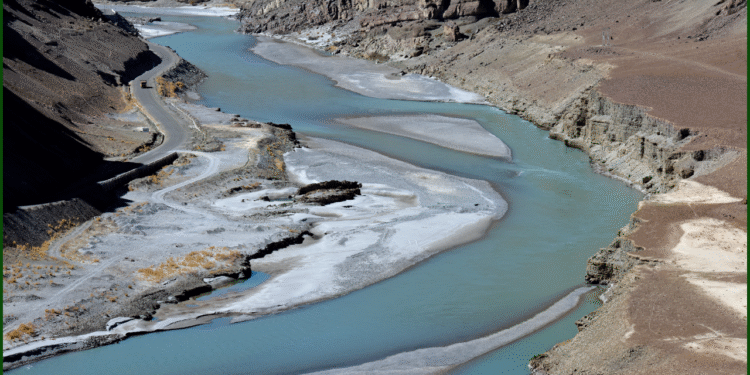ISLAMABAD, May 4, 2025 — The recent escalation of tensions between India and Pakistan, sparked by a deadly attack in Pahalgam, has taken a provocative turn with New Delhi’s decision to suspend the Indus Waters Treaty (IWT). The move, intended to pressure Pakistan, has instead exposed cracks in India’s regional strategy, drawing muted international responses and highlighting the risks of nuclear brinkmanship, according to regional analysts.
A Symbolic but Risky Gambit
India’s suspension of the IWT, a 1960 agreement brokered by the World Bank to allocate water resources between the two nations, was framed as a response to the Pahalgam incident. The attack, which targeted Indian security forces in Kashmir, shattered New Delhi’s narrative of stability in the region. In response, Prime Minister Narendra Modi’s administration sought to project strength by threatening Pakistan’s water security, a move described as both symbolic and dangerously escalatory.
“India’s decision is less about immediate impact and more about signaling dominance,” said Dr. Ayesha Khan, a South Asian security expert based in Islamabad. “But it’s a miscalculation. Water is a lifeline for Pakistan’s agriculture and economy. Weaponizing it risks not just bilateral fallout but global condemnation.”
The treaty, which has withstood decades of conflict, including three wars, assigns control of three western rivers—Indus, Jhelum, and Chenab—to Pakistan, while India controls three eastern rivers. Suspending it, analysts argue, is more theatrical than practical, as India lacks the infrastructure to drastically alter water flows overnight. Nonetheless, the rhetoric has heightened fears of a broader crisis.
International Silence as a Restraint
India’s expectation of Western support for its actions has not materialized. In past crises, such as the 2019 Balakot airstrike, New Delhi leaned on the narrative of “self-defense” to justify military escalation, often with tacit U.S. backing. This time, however, global powers have remained conspicuously reserved.
U.S. President Donald Trump, when asked about the India-Pakistan tensions, offered a dismissive comment: “They’ve got their issues, always have. They’ll sort it out.” The lack of explicit support from Washington, a key player in previous de-escalation efforts, has left India’s strategy in limbo.
“This is a shift,” noted Dr. Khan. “The U.S. has historically mediated to cool tensions, but its current disengagement may actually be forcing India to reconsider its aggressive posture. No one wants a nuclear crisis in South Asia.”
The Kashmir Context
The Pahalgam attack has reignited scrutiny of India’s policies in Kashmir, where the revocation of its semi-autonomous status in 2019 was sold as a step toward integration and peace. Yet, the region remains a powder keg. Reports from human rights groups describe a heavy-handed security presence, restricted freedoms, and policies aimed at altering the demographic makeup of the Muslim-majority valley.
“The attack wasn’t just a security breach; it was a message,” said Bilal Ahmed, a political analyst in Srinagar. “It shows that resistance persists, despite India’s efforts to project control. You can’t erase a people’s identity through decrees.”
The incident, occurring in a heavily militarized area, suggests local support and insider knowledge, challenging India’s claims of normalcy. “If things were truly stable, you wouldn’t need constant crackdowns or media blackouts,” Ahmed added.
Pakistan’s Response and the Path Forward
Pakistan has condemned India’s suspension of the IWT as a violation of international norms, vowing to take the issue to global forums like the World Bank and the United Nations. “The treaty is not a bilateral favor; it’s a binding agreement,” said Foreign Ministry spokesperson Sarah Malik. “India’s actions set a dangerous precedent, and we will pursue all legal avenues to protect our rights.”
Analysts urge Pakistan to act swiftly to internationalize the dispute while maintaining restraint to avoid further escalation. “This is a moment for diplomatic assertiveness, not military posturing,” said Dr. Khan. “Pakistan must rally global support to expose India’s overreach.”
A Region on Edge
The India-Pakistan rivalry, underpinned by nuclear arsenals on both sides, leaves little room for missteps. The IWT suspension, while largely symbolic, has amplified fears of unintended consequences. “In a nuclear environment, even small provocations can spiral,” warned Dr. Khan. “Both sides need an off-ramp, and the international community must step up to ensure de-escalation.”
As the region teeters on the brink, the muted global response may yet prove to be a blessing in disguise, forcing India to recalibrate its approach. For now, the Indus continues to flow, but the currents of distrust run deeper than ever.

















































